- Socialomics Research Center October 05, 2021
-
Recovery of Civic Virtue and a Healthy Society

(Photography by Burst / www.pexel.com)
The Social Health of South Korean Society
The pursuit of a healthy life is a common goal across all societies. However, opinions are divided on what the conditions are to achieve it. As humans lead a "social life" through which they attain self-realization by engaging in exchanges with others, the conditions of a healthy life can be said to stem from healthy relationships between individuals and society.
Social health can be defined as "a state of health, happiness, and increased well-being, both personally and socially." There are fundamental limitations to mainstream health studies focusing on individuals' biological health. Health can also be attained from social integration built through healthy relationships between individuals and society. In other words, individual happiness and quality of life are directly linked to the social level of well-being.
Until recently, South Korean society has been achieving an astonishing rate of development, and people's lives have also become more prosperous than ever. The rapid social transformation, however, has produced various side effects throughout society. The deterioration of the civic virtue that is vital in forming a healthy community has been cited as a critical impediment to sustainable social development and individuals' well-being.
Within South Korean society lies a distinct contrast; South Korea has achieved rapid economic growth propelled by the dedication and efforts of its people, proudly emerging as one of the prominent developed countries in the world, and its vast pool of talents has nurtured pioneers in numerous fields such as health care, education, culture, and IT technology, who present their reputations to the global community. However, at the same time, behind its affluence, there are phenomena that undermine the solidarity of its members, such as high suicide rates, high-income inequality, low life satisfaction, and low level of social trust.
The Socialomics Research Center at Yonsei University, which seeks ways to promote social health by engaging in scientific research on these individual and social problems that are hindering today's social development, is the first research institute to specialize in the study of social health in South Korea. Social health research aims to form a sustainable relationship between individuals and society by promoting healthy social life and cultivating the communal conditions that foster healthy individuals in society.
Operating under the support of the National Research Foundation of Korea through its Social Sciences Korea (SSK) Support Project, the Socialomics Research Center began from a small-scale project group, which later expanded to a large-scale research center in 2018, and is looking for ways to promote socially healthy behaviors both at individuals' behavioral and just levels by integrating psychological, sociological, information scientific and cognitive neuro-scientific approaches under the task name of "Research on Social Health Analysis and Promotion Methodology: Integrative Approach of AI and Social Scientific Methodology."
The Socialomics Research Center, under the research vision "Individuals' Happiness by Promoting Social Health," actively engages in academic, advisory, and public activities to pursue its goal. Specifically, the institution investigates the impacts of social support, social relationship, social activities, and personal behavior necessary to foster social health on individuals' happiness and well-being in multiple ways and seek solutions to relevant problems.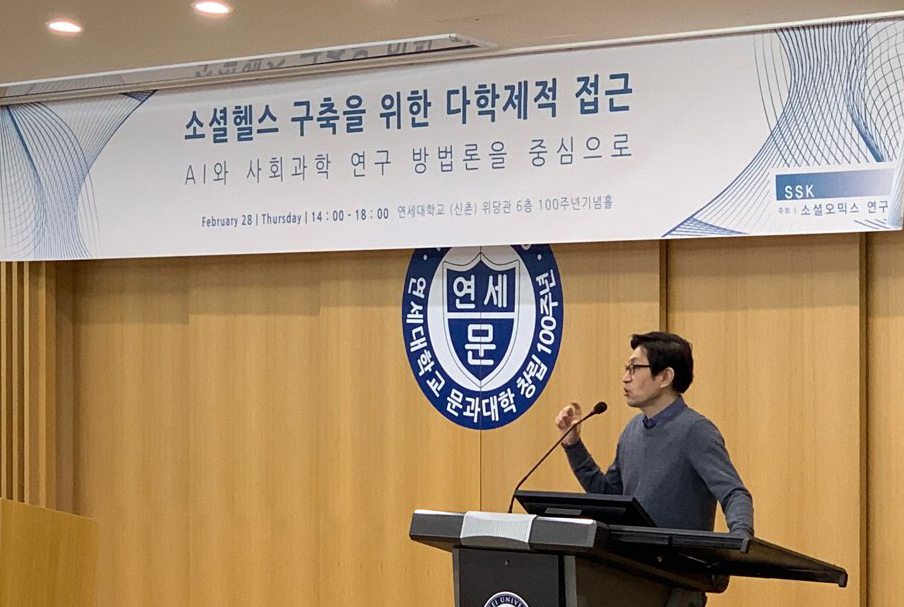
Research Team Composition
The Socialomics Research Center currently has nine domestic and foreign faculty members, four full-time researchers, and 21 research assistants. The research team comprises experts from various fields such as big data analysis, psychology, sociology, media information, and political science, enabling multilayered research and producing meaningful research results to promote social health in Korean society.
The institution operates by dividing and mediating the roles of three constituent research teams - "Personal Behavior Analysis Research Team," "Social Relations and Media Analysis Research Team," and "Social Health Analysis Techniques Research Team" - under the leadership of respective research directors. The Personal Behavior Analysis Research Team consists of researchers and graduate school students majoring in developmental psychology, social psychology, and brain engineering and works together to research the analysis of methods to promote social health at the personal and social levels. The Social Relations and Media Analysis Research Team consists of researchers and participating graduate school students majoring in business administration and information and management systems and take on the role of researching the analysis of social health on a social level. The Social Health Analysis Techniques Research Team comprises researchers majoring in communication sciences and sociology, focusing on developing and distributing integrated social science research methodologies vital to integrative research.
The full-time researchers are also respectively playing key roles in the "Operating Committee, " "Domestic and International Exchange Committee," "Policy Convergence Research Forum," and "Index Production and Analysis Team" within the institution. The Operating Committee oversees the ongoing research to emphasize the significance of social health. The Domestic and International Exchange Committee plays a central role in creating opportunities for academic events and exchanges to promote networking. The Policy Convergence Research Forum is in charge of pursuing the institution's goal to achieve "social and practical contribution of academic research," striving to enhance the civic virtue of the public by utilizing research achievements in public policies. Lastly, the Index Production and Analysis Team is responsible for producing, measuring, and distributing indicators that can compare and analyze social health levels while communicating with the public by publishing monthly social health trend analysis reports.
The Socialomics Research Center also strives to nurture up-and-coming researchers by including students undergoing master's and doctorate programs as student researchers. From 2018 to date, 13 student researchers have published nine research papers in domestic journals and four in international journals, while 30 student researchers have conducted 34 presentations at domestic academic conferences and 23 at international conferences. Out of the graduate students who participated in the research, eight received master's degrees, and three attained doctorate degrees. The institution plans to continue encouraging the participation of student researchers to grant opportunities for them to actively participate in research, training them with the knowledge and skills required for social researches to help them grow as social health researchers.
Professor Song Min (Department of Library and Information Science) heads the institution and is also working as an adjunct professor at the Graduate School of Artificial Intelligence and the Department of Digital Analytics. Recognizing his outstanding research achievements, Professor Song was appointed Underwood Distinguished Professor of Yonsei twice in 2014 and 2020, respectively. Furthermore, Professor Song was awarded the Most Influential Paper Award from the Korean Intelligence Information Systems Society in 2018. In July 2021, he emerged as the author of the top 10 percent of the most cited papers in the internationally renowned journal, 'PLOS ONE.' Professor Song was also awarded the recognition award from the Minister of Education in 2019 for having the largest number of students enrolled in a Korean Massive Open Online Course (K-MOOC) course in the first half of 2018.
Academic Activities and Research Performance
The Socialomics Research Center currently operates the SSK projects, under which the institution focuses on pursuing basic research with themes that befit the definition of social health through its internal workshops, meetings, and academic seminars in its first and second years. Based on this, the institution held an international workshop in its third year to seek cooperation with overseas researchers and deepen its research on social health. Up to the third year, the research performance can be shown across various areas such as 1) social health analysis at the individual and social levels, 2) social health analysis at the levels of social structure and institutions, 3) application of research in social health-related social problems, and 4) social health analysis methodology.
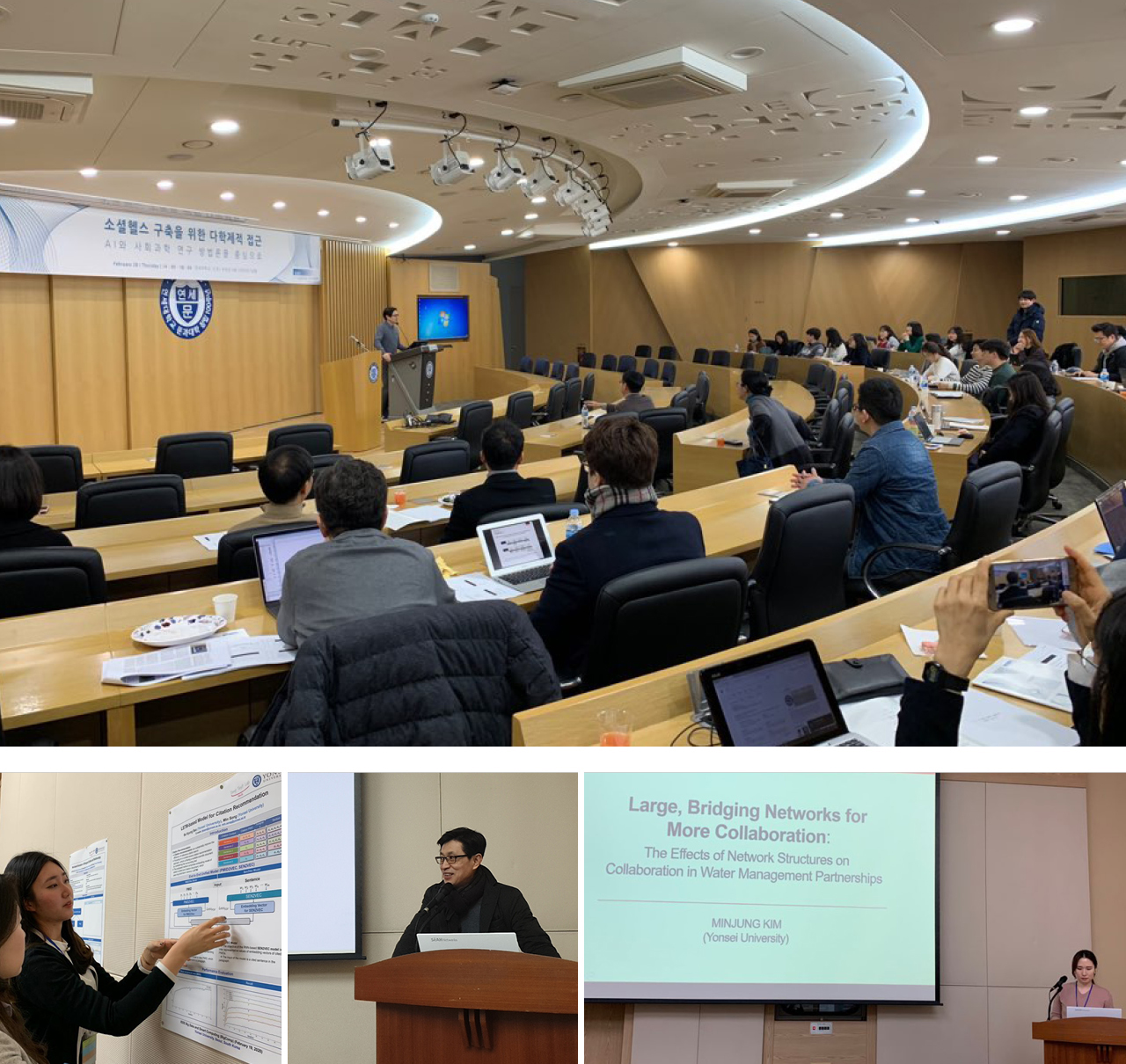
The Socialomics Research Center offers wide opportunities to share and discuss research in the field by actively holding domestic and international workshops. The research center workshops, held twice a year, promote networking among cooperative researchers. The institution also annually hosts an international workshop, "International Workshop on Social Health in the Era of Big Data," at the International Conference on Big Data and Smart Computing (BigComp).
In addition to generous support to ensure the understanding of the flow of research areas among participating researchers and strengthening of academic and practical capabilities, the institution simultaneously provides opportunities for participating student researchers to be introduced to the field by discussing research related to social health topics through networking symposiums. At the second international workshop, International Workshop on Social Health in the Era of Big Data, held in January 2021, the institution invited Professor Ying Ding of the University of Texas at Austin, a figure with an international reputation in big data processing, to discuss the research topics and methods related to the processing of artificial intelligence (AI) big data, one of the most popular research topics. The following workshop was held in the format of an international online workshop. It allowed participating student researchers to exchange with researchers abroad, even when COVID-19 restricted their experiences in international conferences. In particular, the meeting was a great help in acquiring and developing practical integrative research ideas, directions, and research methods through communication with experts in various fields.
Additionally, through the research center's Domestic and International Exchange Committee, the research center has been consistently engaging in research exchanges with Case Western Reserve University (USA) and the University of Wisconsin-Madison (USA) and is also actively involved in academic activities and networking through means such as holding policy seminars with the National Assembly Futures Institute to present the possibility of policy linkage with research results.
The Socialomics Research Center puts extensive effort into being an active organizer, presenter, and debater, with the institution participating in 142 domestic and international academic conferences, symposiums, and seminars from September 2018 to June 2021, and it strives to continue its academic networking online amidst restrictions to face-to-face networking opportunities as a result of global COVID-19 pandemic. The efforts have indeed shown outstanding results, as the institution published a total of 53 papers over the past two years, 24 of which have been published by SSCI/SCI/SCIE-listed journals.
During a time of confusion due to the pandemic, the Socialomics Research Center has continuously made efforts to research and expand its "depression index." The depression index is an indicator representing people's depression trends by analyzing text big data existing on social media with text mining techniques, and in particular, from the third year of operation, the research results of a continuous follow-up study on how Koreans' depression tendencies appear on social media after the COVID-19 outbreak are released on the institution's website (http://shi.yonsei.ac.kr).
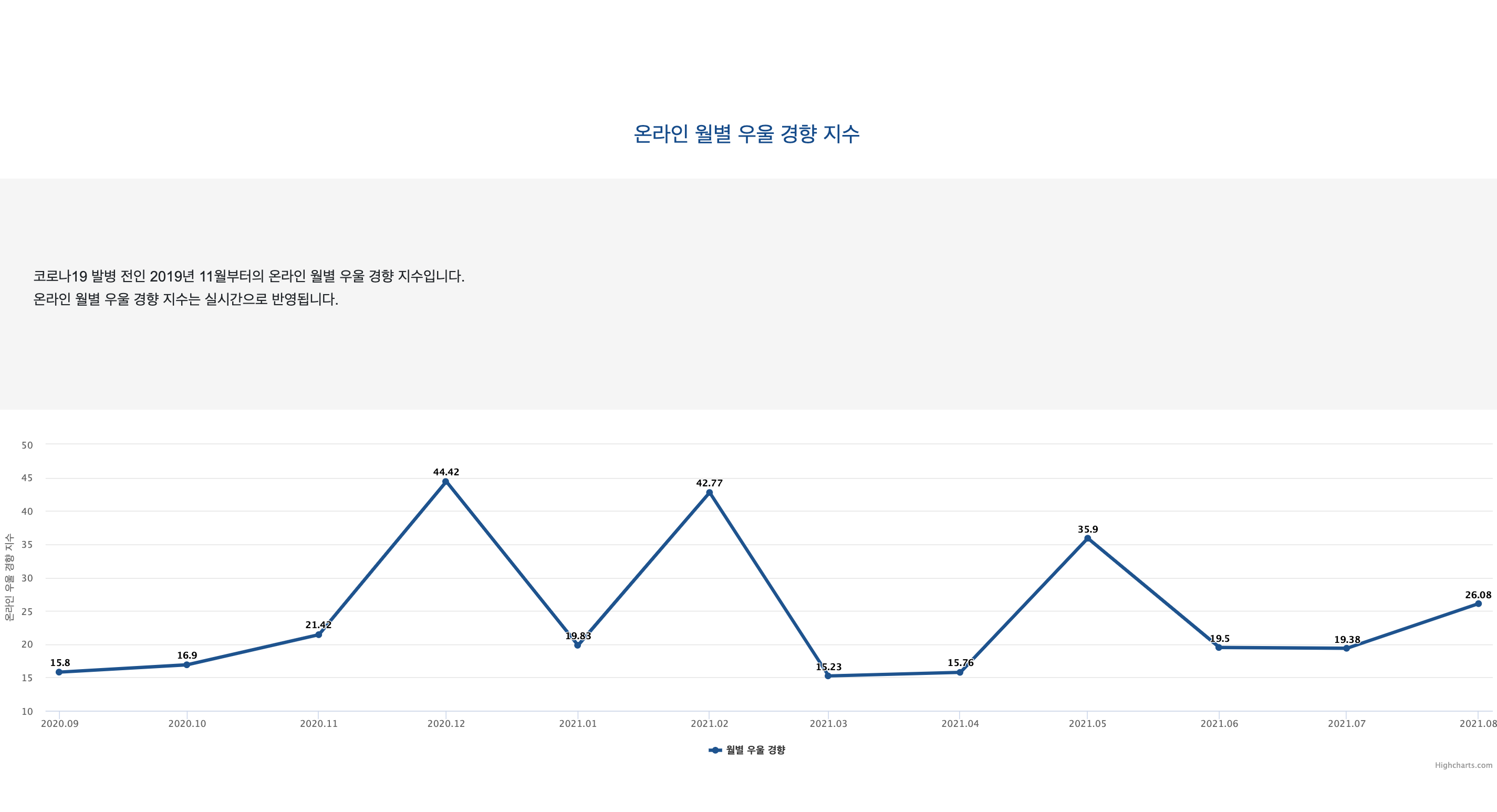
The Socialomics Research Center has published two books so far. In Factors and Measures to Promote Social Health: Individuals, Relationships, and Society, the institution reviewed the theoretical concept and empirical measurement methods of social health, along with an exploration of various determinants and promotion measures of social health across three dimensions: individual, relationship, and society. The following publication shows significance for its attempt to foster collaboration among various academic fields such as the library and information science, psychology, sociology, political science, and communication sciences. When dealing with the topic of social health analysis, there were meaningful attempts to combine AI/big data research methodology with that of social science research.
Additionally, in 2021, based on the contents of the previous publication, another book, Social Health and Our Society after COVID-19, was published through the collaborative writing of all joint researchers at the institution to expand the scope of the debate to the social issues that we are faced with currently. In order to analyze the extensive effect of the COVID-19 pandemic on Korean society as a whole and each constituent member in terms of social health, the book attempts to interpret social phenomena from the viewpoints of various academic fields such as the library and information science, psychology, sociology, and political science, while seeking common contact points across the dimensions of individual, relationship, and society. Specifically, the book discusses the social health measurement methods through index development and the concept of healthy families, social relations, and communities in the COVID-19 era. With the book not only attempting interdisciplinary collaboration of all joint researchers but also being an academic book that deals with the actual social issue through theoretical concepts of social health, it is of great significance.
Based on the concept of social health established so far, the Socialomics Research Center is expanding its research through collaboration between cooperative researchers and multidisciplinary research, seeking the applicability of the study to actual social issues. The concept of social health is examined mainly in terms of individuals, relationships, and society. Based on the following concepts, the research on "The Evolution of Social Health Research Topics: A Data-Driven Analysis" was conducted in collaboration with three co-researchers, combining social science and medicine. After collecting data on "social health" as the query term, topic modeling was performed by dividing perspectives into the past, present, and future to show the characteristics of social health studies so far. It was confirmed that future social health studies must take an interdisciplinary approach.
Expanding the Research to Build a Healthy Society
The Socialomics Research Center has been focusing on social health, which is one of the three definitions of health defined by the World Health Organization: physical health, mental health, and social health. In addition to the academic development of social health research, measures to expand policy and social implications have been sought through signing MOUs with other research institutes or policy-related institutions.
In May 2021, the institution signed an MOU agreement with the Digital Medical Industry Center of Yongin Severance Hospital for joint research to carry out a mutual advisory role in research and development, selecting collaborative research topics related to social health and holding joint seminars to create a linkage in education and research. The MOU is expected to contribute to establishing a healthy society by carrying out meaningful convergence research tasks between the Socialomics Research Center and the medical sector, ultimately enhancing social health in Korean society.
To list an example of specific activities through MOU agreements, there is research networking through which the institution analyzed the growing trend of panic disorder patients from the perspective of big data. This research collected data related to panic disorder existing on social media, after which the institution consulted with psychiatry experts to study panic disorder, highlighting the health problems of individuals from a social level. Such a convergent attempt is meaningful in that it is possible to analyze social health by examining the texts from social media spaces by identifying the level of panic disorder in everyday life since they are familiar to the public and sharing people's daily life experiences.
In addition, to strengthen the institution's policy implementation capability, discussions are currently being in progress with the National Assembly Futures Institute on signing an MOU. The following MOU with the National Assembly Futures Institute is expected to be a valuable opportunity to prove the benefits of an integrated approach centered on the concept of social health in solving South Korea's overall social problems. With this MOU, the institution aims to push for cooperative projects such as the provision of social health data and sharing of analysis techniques, and through regular networking, it plans to win projects that the entire institution can participate in. In particular, there is strong motivation to hold regular policy seminars with the National Assembly Futures Institute to focus on finding ways to practically utilize the research results in society. In the future, by expanding the size of the social health-related indicator production and analysis team, the institution aims to develop various methodologies and theoretical approaches that can improve social health while increasing the research requests from the government.
Apart from that, the research center strives to spread research results academically and socially, with research managers and joint researchers conducting research cooperation and collaborative projects with various government agencies and private companies based on research results attained so far. With active and extensive participation from government and public institutions such as Korea Environmental Industry & Technology Institute under the Ministry of Environment, Korea Water Resources Corporation, and Korea Centers for Disease Control and Prevention to policy research and project planning in organizations in the civilian sector such as Yonsei University, Lotte Chilsung Beverage, BigCare and Rocket View, the institution is contributing to the promotion of social health in Korean society.
The Socialomics Research Center has also been continuing its free education program support project since its first year to enhance the public interest in its projects. Despite the COVID-19 pandemic, the institution developed a free online education platform, where a methodology lecture video was uploaded to the public. In 2020, Professor Lee Keeheon (Underwood International College) also opened a lecture on big data, with sub-topics of data analysis, data mining, big data processing, and big data clusters. The research center plans to continue providing educational content and programs on AI and big data analysis for social science research to the general public and researchers.
To expand the sphere of influence of the research center's research results to be practically used to solve various social problems in South Korean society, the institution promoted its research results, delivering social messages through the media. Cooperative researcher Professor Young-Hoon Kim (Department of Psychology) has published a column in the Kukmin Daily since August 2020 introducing marital psychology research across various fields such as marital dialogue, gender difference, and affection expression, to enhance public intimacy and practical implications for psychological research related to marital relations. Another cooperative researcher Professor Hackjin Kim (Department of Psychology, Korea University), introduced the latest research results on the brain science principles of decision-making that lead to confirmation bias when he appeared on a special program on KBS TV.
The Socialomics Research Center recognizes the tasks of social science research, which require the presentation of measures to recover and promote civic virtue appropriate for rapid social change, and strives to carry out the corresponding research. Specifically, the institution seeks to 1) improve social morality and reliability, 2) explore ways to improve the mental health of individuals and families, 3) explore ways to establish a healthy market order following the development of technology, 4) analyze ways to resolve social conflicts and solve social problems, and 5) improve the social science research methodology.
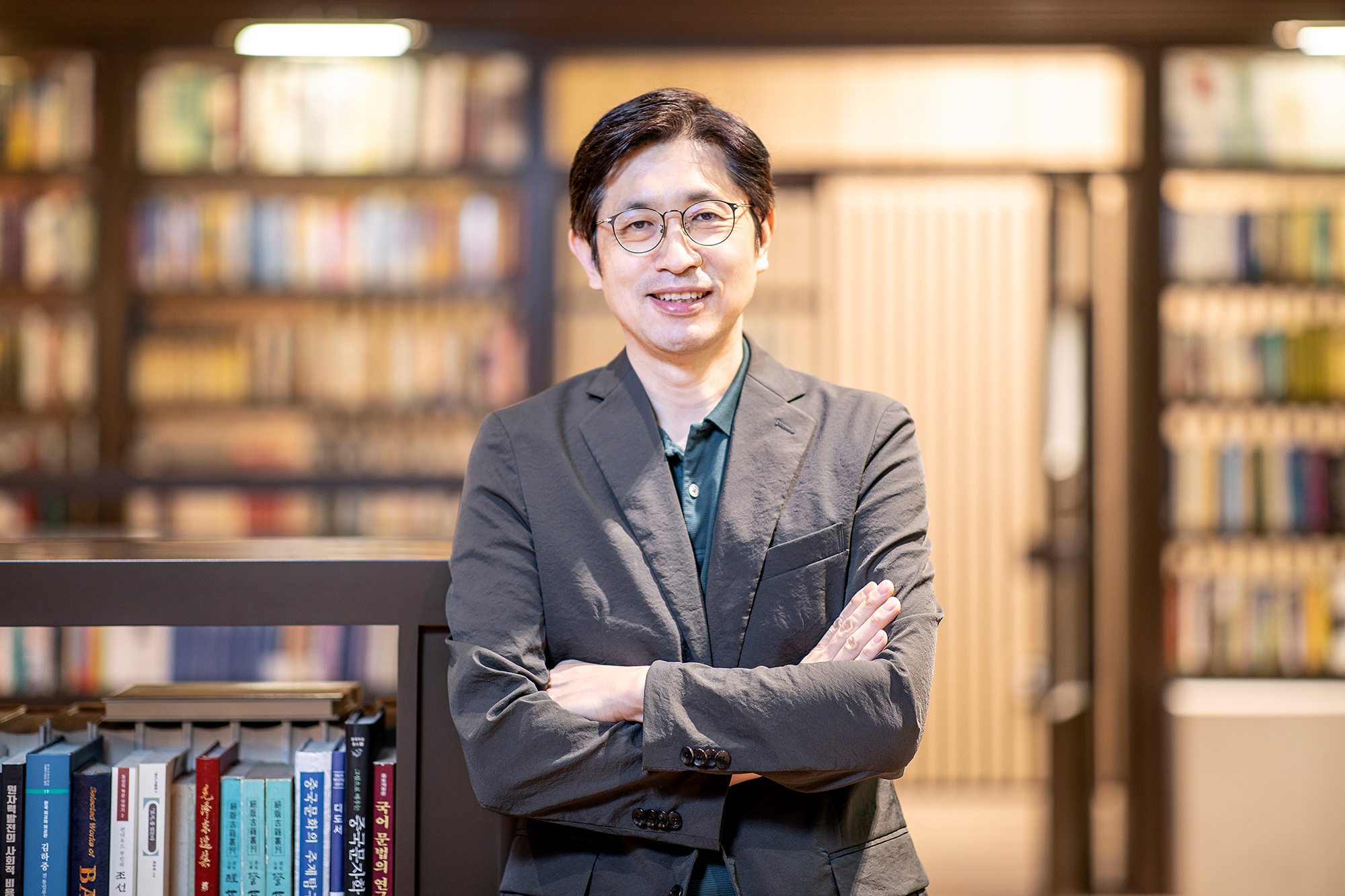
"Everyone wants to lead a healthy life.
Especially with the recent pandemic, health has become the world's most important agenda.
The Socialomics Research Center has been conducting systematic and scientific integrative research
on what a healthy life is and how it can be measured and achieved.
In particular, with humans constantly interacting and living in social relationships,
health should also be analyzed through the integrated and organized context of individuals and society: "social health.""
Professor Song Min
Director, the Socialomics Research Center
Professor, the Department of Library and Information Science, Yonsei University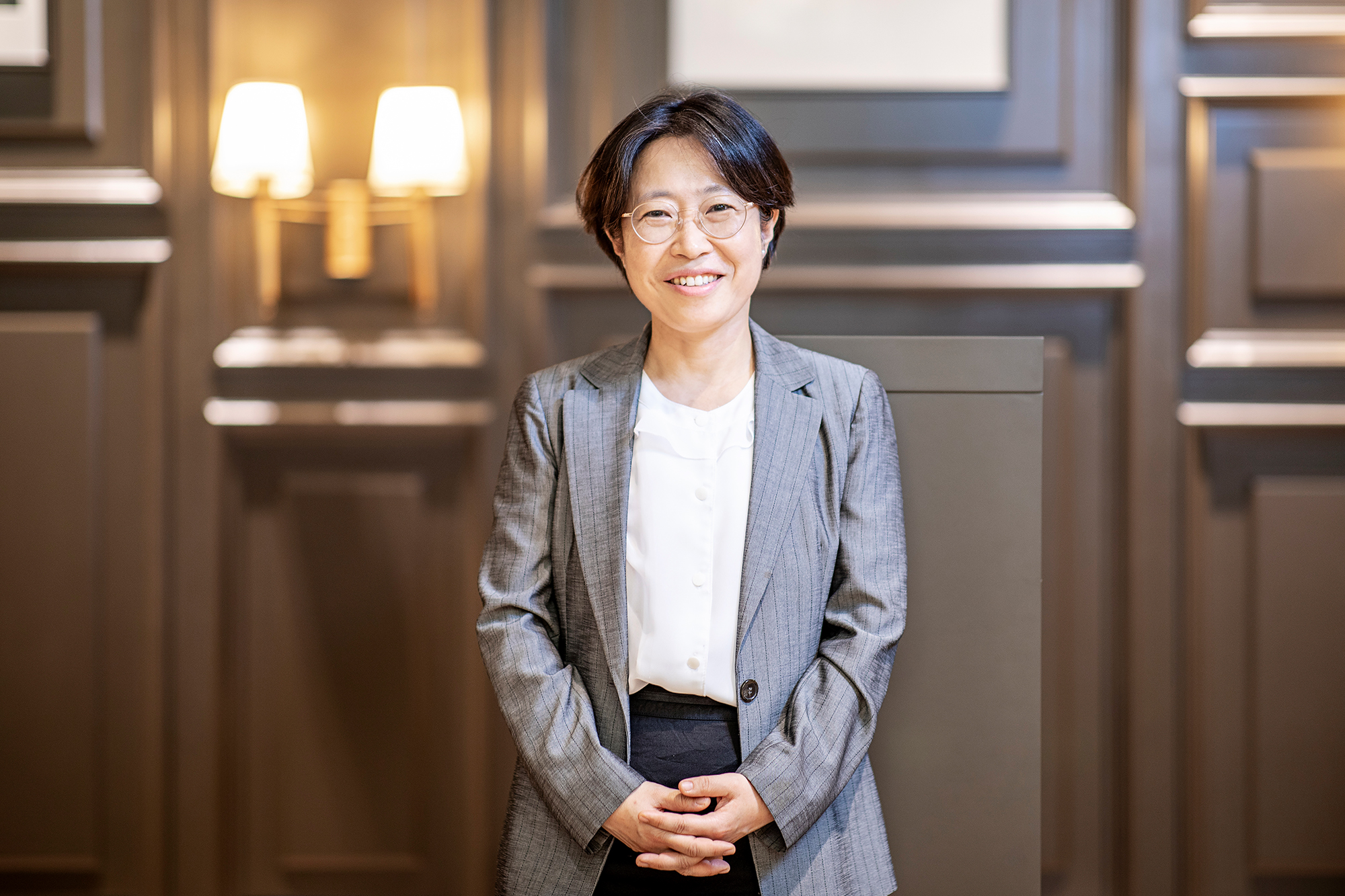
"Fast social changes, such as the Fourth Industrial Revolution and the advent of the COVID-19 era,
call for a new research frame on community and individual health.
The Socialomics Research Center proposes the concept of social health as a frame for multidimensional health
required in this era and is conducting integrative research on how to establish social health.
Our researchers have found the key element of social health as positive relationships between community members
in on-off spaces and have produced research data on how individual relationships
or behavior patterns affect the health of society as a whole and how changes in society affect individual lives
that is private and intimate. These findings can be used as basic scientific data to contribute
to individual growth and community integration in the post-COVID-19 era."
Professor Song Hyun-Joo
Cooperative Researcher, the Socialomics Research Center
Professor, the Department of Psychology, Yonsei University
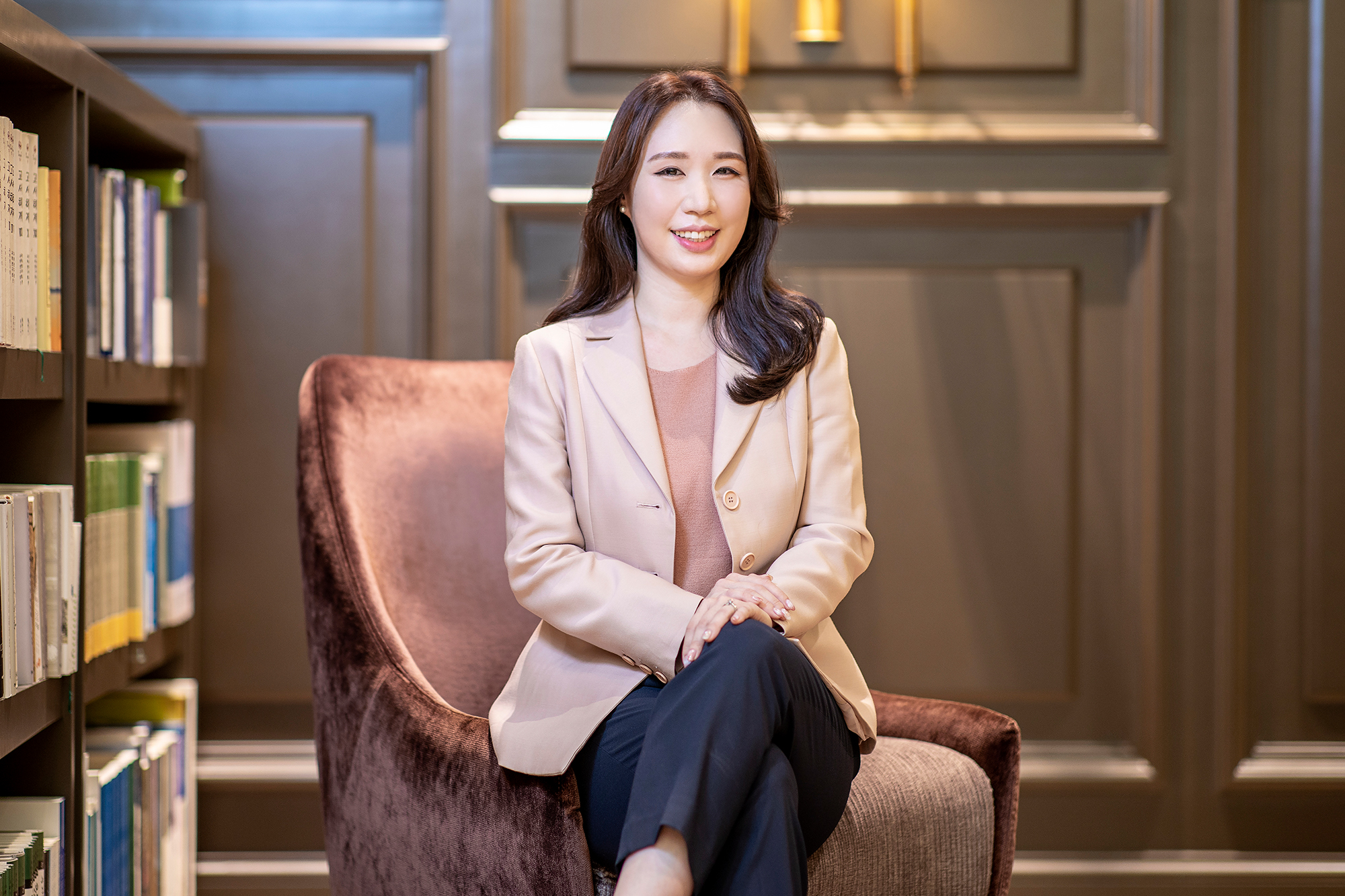
"For long, we have viewed health as an individual issue.
However, we cannot lead a healthy life entirely by our individual efforts and will.
This is why we should pay attention to social, institutional, and political factors that profoundly impact individual health. To this end, the Socialomics Research Center is researching social health concepts in various fields
and continuing to make efforts to apply these researches to policy implementations
to promote social health in South Korean society."
Dr. Kim Minjung
Full-time Researcher, the Socialomics Research Center,
Ph.D. in Political Science
show mobile menu
mobile menu




